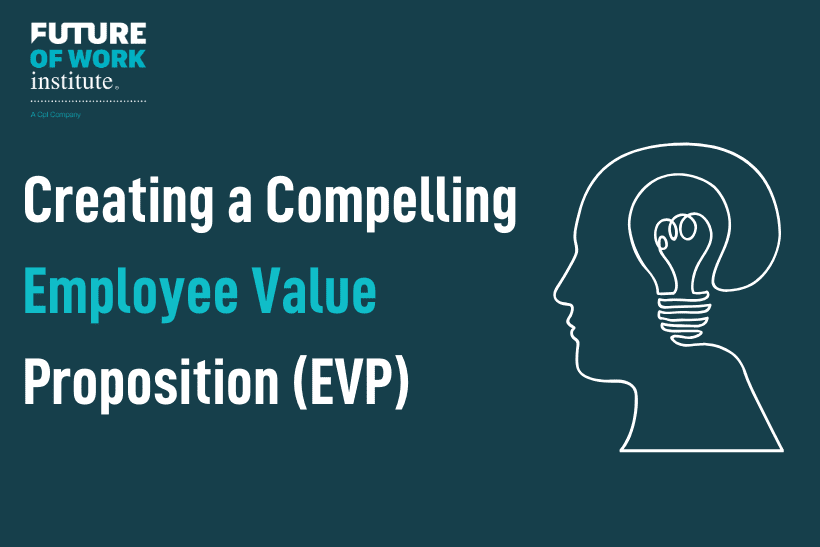Today, organisations are finding themselves in a race for talent in an ultra-competitive and hyper globalised market. In order to attract, engage and retain the best people they need to purposefully design a destination business. One that draws people to them and for the right reasons.
This is about more than an employer 'brand'. It is about a strategic approach to crafting a compelling proposition - an Employee Value Proposition (EVP)- that gets, and gets the most out of, the best possible people who are most aligned with the direction of travel that the business is on.
What is EVP & Why it's Different to Employer Branding
An Employee Value Proposition (EVP) is the set of unique financial and nonfinancial attributes that the talent marketplace and employees (current, present and past) perceive as the value they gain through employment in a role.
In exchange, the employee brings their competencies, skills, energy and experiences to create value for customers and the business alike. It is the fundamental driver of attraction, retention and engagement and a barometer of what most people will associate with you as an employer.
Until recently organisations have taken a traditional view to the employee proposition. It has been generally narrowly defined to include things like:
Remuneration
Bonus
Holiday
Personal development
But expectations are changing. There is a growing need from employees and prospective employees for different working practices; access to new types of holistic wellness programs; a need to work for companies with a focus on more than just profit; and ones that offer new types of opportunities to use the latest technologies. All in an inclusive culture with a focus on innovation and design.
As a result, we have created and implemented a strategic and holistic EVP model comprised of 20 employee experiences, including:
Business stability and growth
Social capital
Company reputation
Meaningful work
Work/life balance
We have used our comprehensive EVP framework in different types of organisations. A key insight has been the large differences across leadership teams on their perspectives on how evolved their EVP's was.
Lewis Carroll's phrase 'If you don't know where you're going, any road will get you there' springs to mind. It may explain the pre-disposition by HR organisations to drive multiple and disconnected initiatives to move things forward. It is critical that a leadership team arrives at a collective perspective of the 'As Is' prior to any discussion of a future state.
The business reality is that the creation of a meaningful EVP is a strategic endeavour - it isn't a branding exercise. It is a process of firstly, defining the current state of the employer proposition. Then define and co-create a 'To Be' or target state. That is a destination business for the talent you want and the talent that will align with your vision, strategy and objectives.
Employer branding only happens after a clear roadmap of priorities has been developed and clear briefing and directions can be given to marketing and communications teams. The EVP is not owned by HR, but it should be at least directed by HR, and HR must be responsible for it.
Learnings from a Recent Client Case Study
Two recent client workshops demonstrated a mix of aligned and divergent thinking within a leadership team across their EVP. We split the leadership team into three groups, in the interest of finding alignment. All groups were immersed in the framework, associated spoke definitions, scoring system and prompts.
One group perceived they were delivering on best practice in inclusion, empowerment and diversity, giving themselves a 5, whereas another thought they were a 2. Again, across the three teams within the same workshop they all agreed that work/life balance was a key driver of the EVP into the future, as well as CSR and career advancement.
Very quickly we got to a prioritised EVP top line action plan. Other areas being priority 2. The next stage we looked at the local site versus other international sites, and at a wider population within the client. Built on a systematic approach, the framework brought awareness, simplicity, clarity, visual representation and direction to create a meaningful EVP.
Over the course of a half day workshop, our diagnostic quickly allows a leadership team to gauge their own perspectives. More in depth analysis is also possible across other stakeholders including employees (current/past/potential), customers, suppliers, investors.
The diagnostic output regularly demonstrates the contradictory forces and thinking at play between 'people and teams' in the same business. All with the same strategic 'corporate' objectives, but very different sets of values and expectations of their perceptions and what motivates them.
It also enables the curation of a prioritised roadmap for actioning that is meaningful for designing the employee journey and experience that is: authentic,meaningful, human centric and realistic. The EVP has employee centricity at its core.
Cpl's Future of Work Institute is an initiative that explores, questions and helps design future work solutions with our clients, partners collaborators and candidates.
